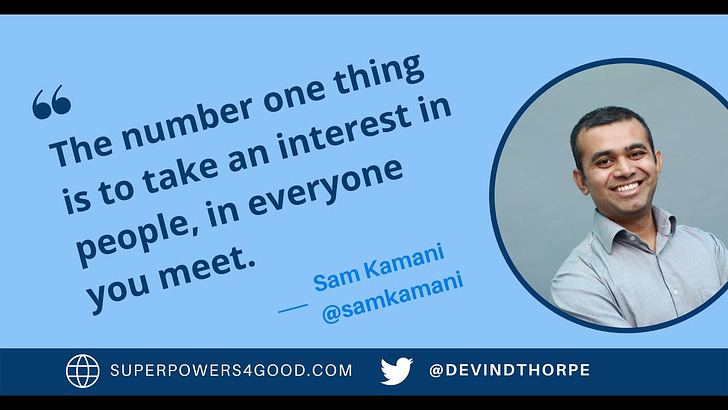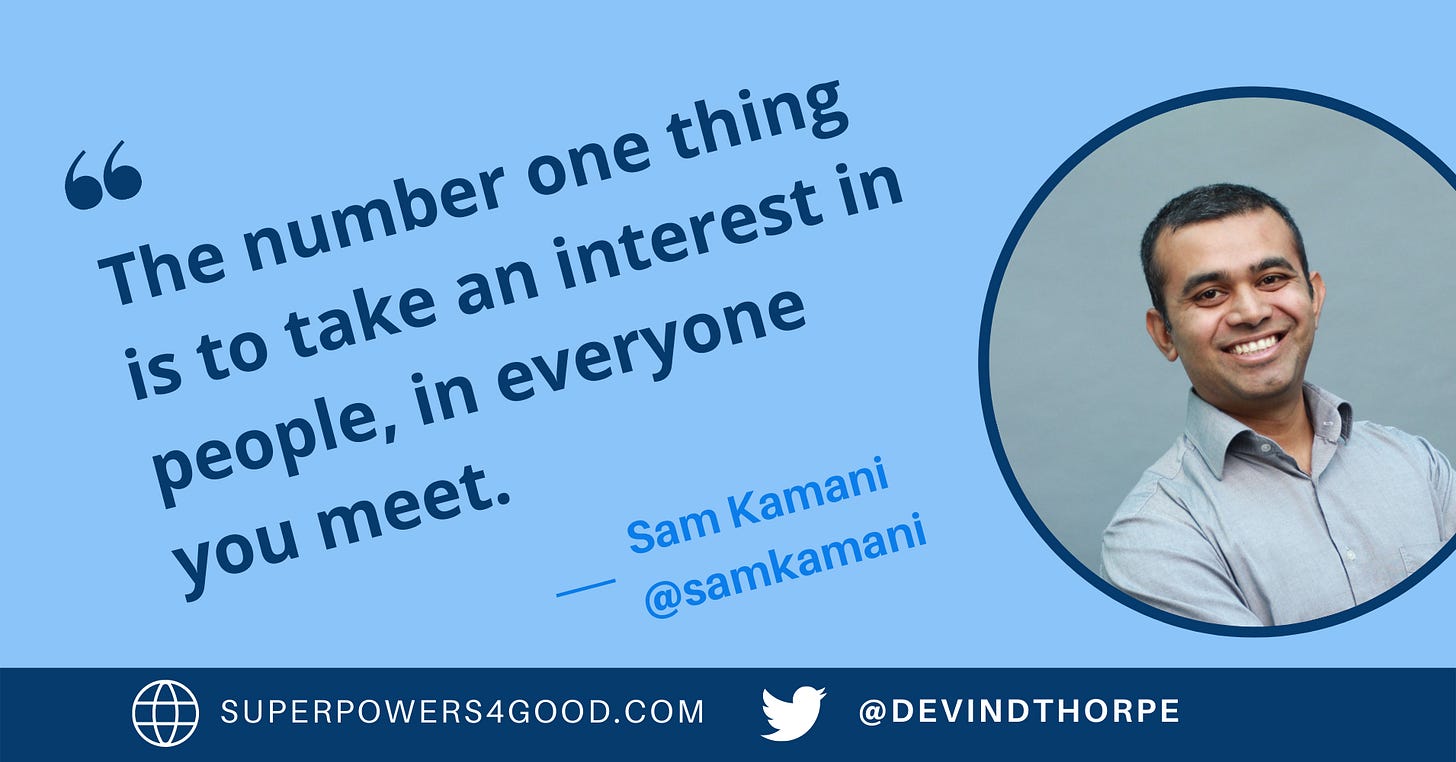Devin: What do you think of as your superpower?
Sam: Oh, my superpower is connecting with people, that’s probably it, it’s, and once again, it comes down to soft skills. It’s not the hard technical skills, even though I was trained as a developer. It’s great to have that technical knowledge, but at the end of the day, it is still people who make decisions.
Tech guru Sam Kamani is taking some adventurous nonprofits on an exploratory mission to the technology frontier where NFTs, web 3.0 and blockchain live.
“This is not something that I’m doing for work,” Sam says of his effort to help nonprofits sell non-fungible tokens or NFTs. “This is a sort of a side project that I saw an opportunity to help charities out there because, as you would know, there are so many amazing people doing amazing work for not-for-profit organizations.”
It is a genuinely innovative approach to helping nonprofits raise money.
It began with a single nonprofit, Gift Global Initiative, led by Sam’s friends. The organization provides solar lights to people in Sub-Saharan Africa that don’t have access to an electric grid. The solar lights are free to operate and require no maintenance—and they have a significant impact on a community without light.
“We decided to create some NFTs. When people purchase these NFTs, starting from something like $200 and each one will deliver solar lights to even up to 10 different homes,” Sam says of the program.
Sam’s goal is to build a platform that will easily allow a nonprofit to create and sell NFTs. “My long-term vision is to make the rules so that any charity can come on and start creating, or we help them create NFTs, a strategy, how to promote it and everything from start to finish so they can start raising some funds.” The site is up at www.thenftcharityproject.com but is not fully functional yet.
At this point, it is helpful to step back and explore just what an NFT is. Sam helped me out.
Let's look at what an NFT is or what a non-fungible token is. So even before we do that, because it hasn't been a word that has been used in our English vocabulary. The word fungible. So first, understanding what is fungible and what is non-fungible. So I see it as non-fungible as sort of more of a unique thing.
I would like to illustrate it with an example say you have a car and I don't own a car. I'm one of your friends. I'm in the same city. I am just visiting you in Florida and I want to. I want to maybe say, borrow your car, which you are not using at the moment. So I said, can I borrow your car for a couple of days? And I do that. I drive it around for two days. I use maybe 10 gallons of fuel or gas, and I refill it with 10 gallons of gas and return it back to you.
The gas in this example is fungible. I can replace it with 10 gallons for 10 gallons, and it would not make any difference to you, but I could not do the same thing—your car in this case is a non-fungible asset.
The fuel was the fungible asset, and in similarly U.S. dollars are fungible asset. We can swap one US dollars each and it's a fungible asset, but two different Michelangelo paintings, even though they are by the same artist, are non-fungible. We cannot just swap.
So we talked about non-fungible, but what about token? So token is the other aspect of it, because each NFT has unique, very long token number and only one of those exist in the world. And these tokens live on your digital wallet. So when you open your digital wallet, that NFT is there. Whereas if you take the screenshot of that image, it won't be living on your digital wallet. And since it's in a blockchain, it gives you the history of who owned it first.
Blockchain is, of course, the underlying technology of cryptocurrencies like Bitcoin. Outside the view of some readers, the crypto economy is booming. Prices rise and fall regularly, but the industry is growing without question. NFTs, the digital title to an asset, is one of the latest iterations. The technology can potentially take on essential roles, including potentially supplanting or supplementing traditional recordkeeping of ownership of physical assets like cars and real estate.
For now, NFTs are used in a variety of ways. For example, Sam says, “Gary Vee or Gary Vaynerchuk, a lot of people might have heard of his name. He uses these as access to his podcast or access to his conference, the V Con the Gary V Conference. What happens, in that case, is that if you own one of his NFTs, then you can use that token number as a ticket, and only then you can go to his conference.”
Sam dreams of NFTs having a big impact on nonprofits. NFTs have gained some excited press over some exceptionally high-priced transactions, most notably the $69 million piece by the digital artist Beeple.
Sam exults:
Not everyone has the time to fly around and go to a big charity event, but now it gives you an instant recognition so that if there is a well-known charity, they have done this and then everyone knows that to buy this artwork, it's a million dollars. That means you have that much money that you have donated to this charity and then you can use that as your Twitter profile. And so it instantly connects you to this club of 100 exclusive people who have given one million to whatever the name of the charity might be.
It is hard to imagine a nonprofit that wouldn’t want 100 $1 million donors bragging about their donations online. Time will tell if the dreams can become reality.
Sam knows a bit about money. He built and sold a tech business. He hosts a podcast, Web3 with Sam Kamani, and has written two books. He immigrated to New Zealand, where he is now based.
Despite his success in tech, he sees connecting with people as a “soft skill” that is his superpower and the key to his success.
How to Develop Connecting With People As a Superpower
Sam says connecting with people is essential to career success. After landing in New Zealand with a college degree, the best job he could find was taking tickets at the ferry. Things got better quickly from there, however.
“I would have applied, probably in my career, you know, hundreds and hundreds of jobs. Every job I got, every interview I got, every business that I owned—it’s all due to connections and the connections that I developed using soft skills,” Sam says. “So, once again, it is the human connection.”
He argues that it isn’t a gift. While he acknowledges he is an extrovert, he argues that introverts could be even more naturally inclined to build close personal relationships.
“This is something that can be learned, just like lifting weights, and you get better at it,” he says. “It is a lot of it is practice.”
“It is super vital to learn this skill, especially if you are in working in charities impacting people,” Sam adds.
He offers one fundamental principle to help you develop the skill. “The number one thing is to take an interest in people, in everyone you meet,” he says. “You ask them genuinely how you can help them. If you have the other person’s interests at heart, people know; people can see, and it automatically works.”
If you begin building on this principle and practice, you can make connecting with people a superpower.

















Share this post